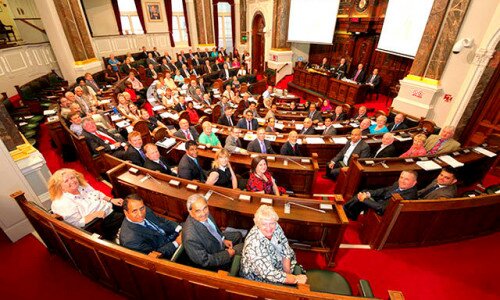
‘No respect, exceptionally rude’: report exposes member-officer tensions at Birmingham council
Some elected members at Birmingham city council are rude to officers and insist on being addressed formally at all times as ‘councillor’, a study into working relationships at the local authority has found.
Recently-elected members have a more “collaborative, informal approach” while the more experienced councillors “feel that they occupy an elevated position”.
The study found a “lack of respect” from long-serving stalwarts for members who have recently joined where the older more established councillors “can sneer at and be more dismissive of the new councillors”.
The university’s Institute for Local Government Studies (INLOGOV) interviewed 16 elected members, 20 officers and 14 partner organisations in order to learn more about relationships at the council.
The findings portray numerous difficulties:
- Backbench councillors feel ignored by the cabinet and kept out of the decision making process
- Some backbenchers feel that cabinet and committee roles are allocated for “political” reasons rather than any ability to do the job
- Elected members generally regard themselves as more important than officers
- Officers are often unwilling to challenge elected members out of a sense of “compliance and deference”
- Some officers, particularly the younger ones, complain of being “intimidated” by “exceptionally rude” councillors.
The study was ordered following the Kerslake Review into the council’s governance arrangements which criticised the blurring of relationships between elected members and officials, where some councillors acted as officers and some officers acted like councillors.
Comments by unidentified councillors include:
The administration keeps people in the dark and we find out from the press. I’ve not seen what’s in the combined authority bid…In all the other councils they’ve shared the details of the bid.
It feels like a secret society. It feels like there is a you don’t need to know culture.
It’s cabinet’s role to meet backbenchers and provide updates, but cabinet seems to feel that when they do they are providing a service that they don’t have to. I’d like to understand what they are doing and how they have arrived at the positions they do.
Too many officers are white, middle aged or older, been here since they left school and are proud of it. They don’t have entrepreneurial skills, don’t know how to do anything different. We need a workforce that looks more like modern Birmingham: young and BME.”
There was a general sense from councillors that the experience, skills and expertise they have is not recognised or valued by the council as a whole. This was particularly felt by the backbench members, with one commenting: “One of the big problems is that the council doesn’t listen to those on the ground who are raising issues”. One backbencher said:
There’s a historic trend that officers bow down to the elected member in their area. Within the group of officers who are working with councillors they show an enormous amount of deference to councillors. I want to be challenged by officers, I want information from them. I don’t want them to be subservient with me because I am a member.
One member commented about how he had been criticised by his colleagues for doing things differently:
I’ve been criticised by colleagues for promoting committee meetings on Facebook. 50-60 showed up as opposed to the usual 5-6 and I was asked why do you want so many residents to turn up?
Members spoke about the complexity caused by cabinet portfolios, redesigned in 2012, not mapping neatly onto the newly formed directorates.
A lot of portfolios now are cross cutting and that’s messier, more problematic. There is a perspective that officers report to different people and…go to see whoever they think they will get the answer they want from. It is much more difficult to hold officers accountable for things.
There was a strong sense from elected members that Birmingham city council can be an introspective organisation that does not always look beyond its boundaries for new ideas and best practice.
“Arrogance bizarrely… quite bizarrely – “we are Birmingham we are the biggest local in Europe therefore we know best”, one member commented.
Comments by the council officers interviewed included:
Members use a hierarchy. They manipulate lower-level officers who can’t say no into agreeing to do things which then puts their boss into a difficult position and difficult discussions take place.
Members should be more about community representation and enablement, not a manager of services. At the moment they see themselves as add-on service managers. They are actively involved in the day to day issues of the office. Lines have become blurred.
Members want influence in day to day operations. They want to ‘cross the t’s and dot the i’s on reports. They want too much influence.”
There was a sense from some officers that there was a “culture of deference to members” which resulted in officers not having the confidence to challenge members.
It’s a culture which says if the leader says it, or a cabinet member says it, or they even think it, everyone has to do it… It encourages officers to be passive: ‘I was just doing what I was told’. That’s not good.
Similar Articles
Urgent action needed to tackle Birmingham’s skills deficit 0
Birmingham’s future economic success will be seriously constrained unless national and local leaders take wide-ranging
Birmingham does cranes…and skills debates 0
If you walk around Birmingham city centre, you can’t help but bump into one of
Combined Authorities ARE local government: WMCA CEO learns the hard way 3
Want a recipe for a one-day conference leaving your austerity-battered punters feeling both happy and
Midlands UK announces programme for MIPIM 2018 0
Midlands UK has announced its event programme for MIPIM 2018, with a Midlands-wide delegation attending
Send for Allardyce! We’re topping the wrong league tables 0
As you’ll have noticed, it’s the awards season. We’ve had the BAFTAs and the Brits,










